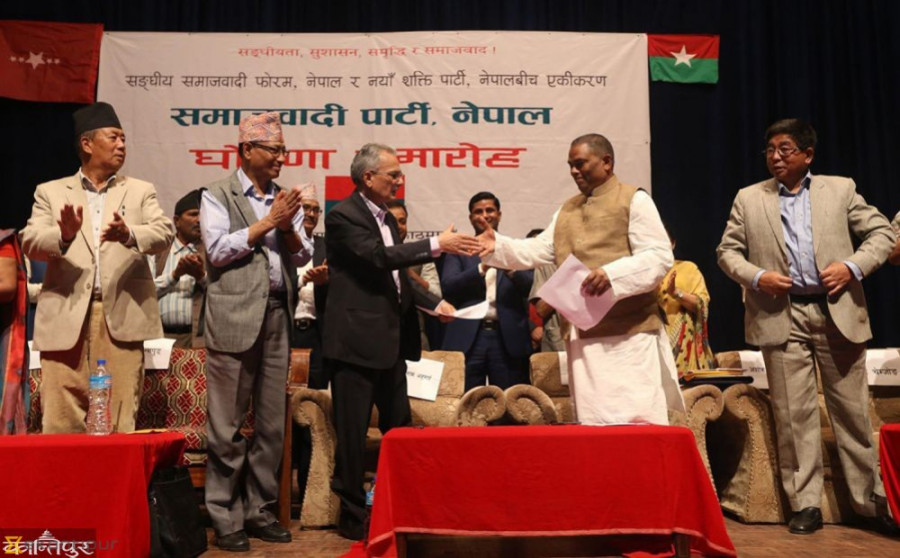Politics
As Upendra Yadav renews push for amending constitution, party members doubt the demand’s weight
Political analysts say making a genuine effort to demand constitutional amendments would require quitting the government first
Tika R Pradhan
Leaders of the newly formed Samajbadi Party Nepal—Baburam Bhattarai and Upendra Yadav—on Saturday warned that they would pull out of the government if it continued to ignore their demand for amending the constitution.
An amendment to the constitution has long been on the agenda for Yadav, whose Sanghiya Samajbadi Forum-Nepal unified with Bhattarai’s Naya Shakti Party last month. But it was an irony that Yadav’s party chose to become part of the government led by KP Sharma Oli, who has never been committal to constitution amendment.
Now, Bhattarai and Yadav together have begun pushing the issue of amendment, which political analysts say makes little sense until the party quits the government. But Samajbadi Party leaders say there’s little likelihood of quitting the government anytime soon.
This leaves the two leaders with the only answer: pressure tactics.
Yadav, a Maoist leader for a long time, became a known face in national politics after the 2007 Madhes Movement. Burning of the interim constitution at his behest at Maitighar Mandala established him as a Madhesi leader who spoke for Madhesis and stood for them.
But after the 2008 Constituent Assembly elections, Yadav has been one of a few leaders in Nepal who have been consistently in power. His fissiparous politics—he has split his own party a number of times to ensure he remains in power—has made even Madhesi people wonder whether he really wants an amendment to the constitution.
Party insiders who spoke to the Post say they don’t find much weight in Yadav’s demand for constitution amendment.
“It’s not easy to remain out of power; you are in politics to be in power,” said a central committee member on condition of anonymity because he feared retribution.
According to him, Yadav may be just playing ball because Bhattarai wants to push the agenda of constitution amendment.
Ganga Shrestha, general secretary of the party, said everyone knows Oli is an illiberal character but he had agreed to address then Sanghiya Samajbadi Forum-Nepal’s demand for constitutional amendments just to ensure a two-thirds majority for his government in Parliament.
“Now Oli has forgotten it. So we need to create pressure,” Shrestha told the Post. But he did not say whether the party was ready to quit the government right away.
Another Madhesi front—Rastriya Janata Party-Nepal—which has also been demanding charter revision, left the government on March 6 after a district court sentenced one of its lawmakers to life in prison for the 2015 Tikapur violence.
Theoretically, Yadav is on the same page with Bhattarai when it comes to constitution amendment. Bhattarai left the Maoist party less than two weeks after the promulgation of the constitution in 2015. Though he was the chairperson of a crucial dialogue committee of the Constituent Assembly, he says he had reservations about the constitution.
Bhattarai’s arguments were similar to those of Yadav’s party and other Madhes-based parties—that the constitution discriminated against some sections of the society. When the constitution was promulgated in 2015—through what many call a fast-tracked process—Yadav and other Madhesi leaders had vehemently opposed.
The first amendment to the constitution was made in January the following year, but Yadav said it still fell short of meeting his party’s demands.
On Sunday, while addressing the party’s internal political training in Surkhet, Yadav reiterated that the party would remind the Oli government once again of the agreement on constitution amendment before quitting the government.
Political analysts say Yadav’s recent moves are guided by a couple of factors: one, CK Raut’s decision to renounce his “free Madhes” campaign; and second, recent political developments in the Capital.
“Yadav has a tendency to make decisions based on the political developments,” said Chandra Kishore, a political commentator who closely follows Madhes politics. “He is weighing internal and external conditions.”
According to observers, Yadav is gradually losing ground in Madhes, largely due to his penchant for power. And Raut’s entry into mainstream politics could make it even more difficult for him to enjoy the clout he once used to, they said. Many believe Yadav could have decided to join hands with Bhattarai, after a failed attempt two years ago, largely because of CK Raut’s sudden decision to shake hands with Oli.
Yadav’s repeated calls for constitution amendment, which has not happened in the one year since he joined the government, also come at a time when there is a power struggle within the ruling Nepal Communist Party (NCP). Raising the issue of constitution amendment, Yadav appears to be putting pressure on Oli at a time when the two NCP chairpersons are debating over internal power play.
Last week, NCP Co-chairman Pushpa Kamal Dahal suddenly started discussing an agreement he had reached with fellow leader and Prime Minister Oli, which talked about them taking turns to lead the government.
Many leaders from the Sanghiya Samajbadi Party say they find Dahal more lenient when it comes to constitution amendment and addressing their concerns.
“In terms of taking proper initiatives on issues, including constitution amendment, Dahal is better than Oli,” said Rakam Chemjong, vice-chairman of the Samajbadi Party Nepal. “Nonetheless, whatever it is between Oli and Dahal is their party’s internal matter and we don’t want to comment on it.”




 14.12°C Kathmandu
14.12°C Kathmandu















